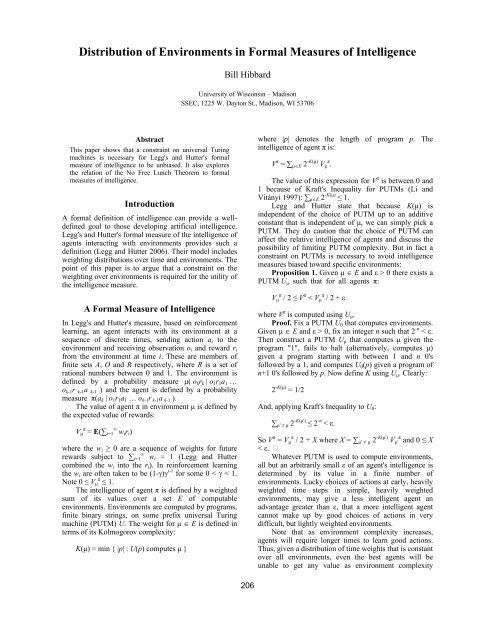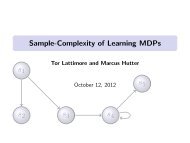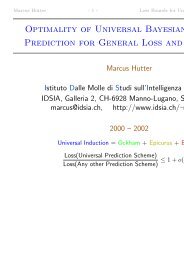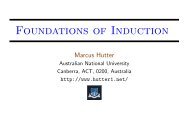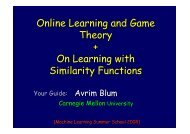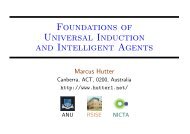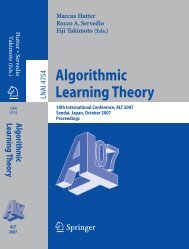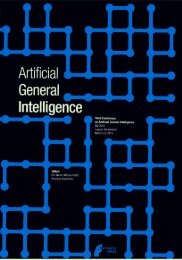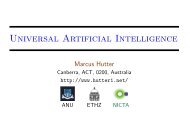A Framework for Evaluating Early-Stage Human - of Marcus Hutter
A Framework for Evaluating Early-Stage Human - of Marcus Hutter
A Framework for Evaluating Early-Stage Human - of Marcus Hutter
You also want an ePaper? Increase the reach of your titles
YUMPU automatically turns print PDFs into web optimized ePapers that Google loves.
Distribution <strong>of</strong> Environments in Formal Measures <strong>of</strong> Intelligence<br />
Abstract<br />
This paper shows that a constraint on universal Turing<br />
machines is necessary <strong>for</strong> Legg's and <strong>Hutter</strong>'s <strong>for</strong>mal<br />
measure <strong>of</strong> intelligence to be unbiased. It also explores<br />
the relation <strong>of</strong> the No Free Lunch Theorem to <strong>for</strong>mal<br />
measures <strong>of</strong> intelligence.<br />
Introduction<br />
A <strong>for</strong>mal definition <strong>of</strong> intelligence can provide a welldefined<br />
goal to those developing artificial intelligence.<br />
Legg's and <strong>Hutter</strong>'s <strong>for</strong>mal measure <strong>of</strong> the intelligence <strong>of</strong><br />
agents interacting with environments provides such a<br />
definition (Legg and <strong>Hutter</strong> 2006). Their model includes<br />
weighting distributions over time and environments. The<br />
point <strong>of</strong> this paper is to argue that a constraint on the<br />
weighting over environments is required <strong>for</strong> the utility <strong>of</strong><br />
the intelligence measure.<br />
A Formal Measure <strong>of</strong> Intelligence<br />
In Legg's and <strong>Hutter</strong>'s measure, based on rein<strong>for</strong>cement<br />
learning, an agent interacts with its environment at a<br />
sequence <strong>of</strong> discrete times, sending action ai to the<br />
environment and receiving observation oi and reward ri<br />
from the environment at time i. These are members <strong>of</strong><br />
finite sets A, O and R respectively, where R is a set <strong>of</strong><br />
rational numbers between 0 and 1. The environment is<br />
defined by a probability measure μ( okrk | o1r1a1 …<br />
ok-1r k-1a k-1 ) and the agent is defined by a probability<br />
measure π(ak | o1r1a1 … ok-1r k-1a k-1 ).<br />
The value <strong>of</strong> agent π in environment μ is defined by<br />
the expected value <strong>of</strong> rewards:<br />
Vμ π = E(∑i=1 ∞ wiri)<br />
where the wi ≥ 0 are a sequence <strong>of</strong> weights <strong>for</strong> future<br />
rewards subject to ∑i=1 ∞ wi = 1 (Legg and <strong>Hutter</strong><br />
combined the wi into the ri). In rein<strong>for</strong>cement learning<br />
the wi are <strong>of</strong>ten taken to be (1-γ)γ i-1 <strong>for</strong> some 0 < γ < 1.<br />
Note 0 ≤ Vμ π ≤ 1.<br />
The intelligence <strong>of</strong> agent π is defined by a weighted<br />
sum <strong>of</strong> its values over a set E <strong>of</strong> computable<br />
environments. Environments are computed by programs,<br />
finite binary strings, on some prefix universal Turing<br />
machine (PUTM) U. The weight <strong>for</strong> μ ∈ E is defined in<br />
terms <strong>of</strong> its Kolmogorov complexity:<br />
K(μ) = min { |p| : U(p) computes μ }<br />
Bill Hibbard<br />
University <strong>of</strong> Wisconsin – Madison<br />
SSEC, 1225 W. Dayton St., Madison, WI 53706<br />
206<br />
where |p| denotes the length <strong>of</strong> program p. The<br />
intelligence <strong>of</strong> agent π is:<br />
V π = ∑μ∈E 2 -K(μ) Vμ π .<br />
The value <strong>of</strong> this expression <strong>for</strong> V π is between 0 and<br />
1 because <strong>of</strong> Kraft's Inequality <strong>for</strong> PUTMs (Li and<br />
Vitányi 1997): ∑μ∈E 2 -K(μ) ≤ 1.<br />
Legg and <strong>Hutter</strong> state that because K(μ) is<br />
independent <strong>of</strong> the choice <strong>of</strong> PUTM up to an additive<br />
constant that is independent <strong>of</strong> μ, we can simply pick a<br />
PUTM. They do caution that the choice <strong>of</strong> PUTM can<br />
affect the relative intelligence <strong>of</strong> agents and discuss the<br />
possibility <strong>of</strong> limiting PUTM complexity. But in fact a<br />
constraint on PUTMs is necessary to avoid intelligence<br />
measures biased toward specific environments:<br />
Proposition 1. Given μ ∈ E and ε > 0 there exists a<br />
PUTM Uμ such that <strong>for</strong> all agents π:<br />
Vμ π / 2 ≤ V π < Vμ π / 2 + ε<br />
where V π is computed using Uμ.<br />
Pro<strong>of</strong>. Fix a PUTM U0 that computes environments.<br />
Given μ ∈ E and ε > 0, fix an integer n such that 2 -n < ε.<br />
Then construct a PUTM Uμ that computes μ given the<br />
program "1", fails to halt (alternatively, computes μ)<br />
given a program starting with between 1 and n 0's<br />
followed by a 1, and computes U0(p) given a program <strong>of</strong><br />
n+1 0's followed by p. Now define K using Uμ. Clearly:<br />
2 -K(μ) = 1/2<br />
And, applying Kraft's Inequality to U0:<br />
∑μ' ≠ μ 2 -K(μ') ≤ 2 -n < ε.<br />
So V π = Vμ π / 2 + X where X = ∑μ' ≠ μ 2 -K(μ') Vμ' π and 0 ≤ X<br />
< ε.<br />
Whatever PUTM is used to compute environments,<br />
all but an arbitrarily small ε <strong>of</strong> an agent's intelligence is<br />
determined by its value in a finite number <strong>of</strong><br />
environments. Lucky choices <strong>of</strong> actions at early, heavily<br />
weighted time steps in simple, heavily weighted<br />
environments, may give a less intelligent agent an<br />
advantage greater than ε, that a more intelligent agent<br />
cannot make up by good choices <strong>of</strong> actions in very<br />
difficult, but lightly weighted environments.<br />
Note that as environment complexity increases,<br />
agents will require longer times to learn good actions.<br />
Thus, given a distribution <strong>of</strong> time weights that is constant<br />
over all environments, even the best agents will be<br />
unable to get any value as environment complexity


